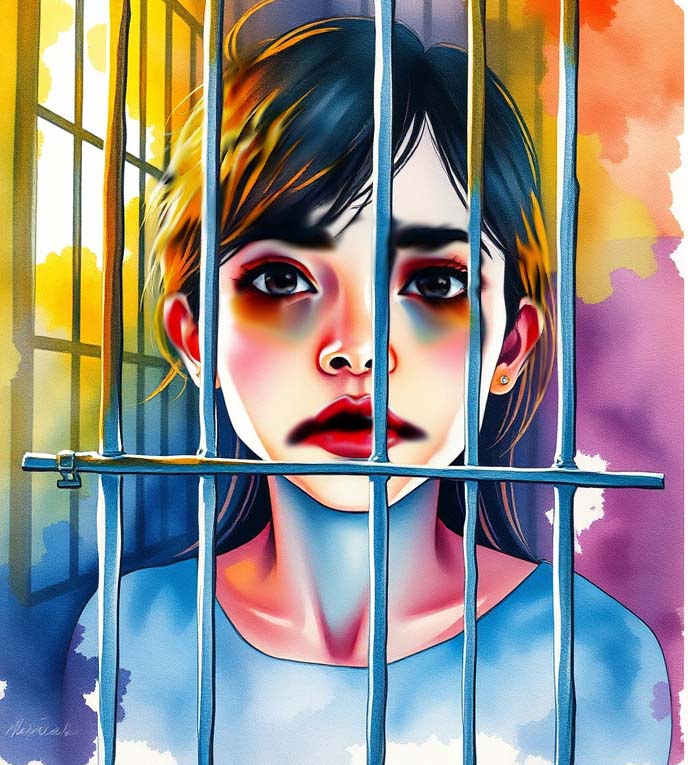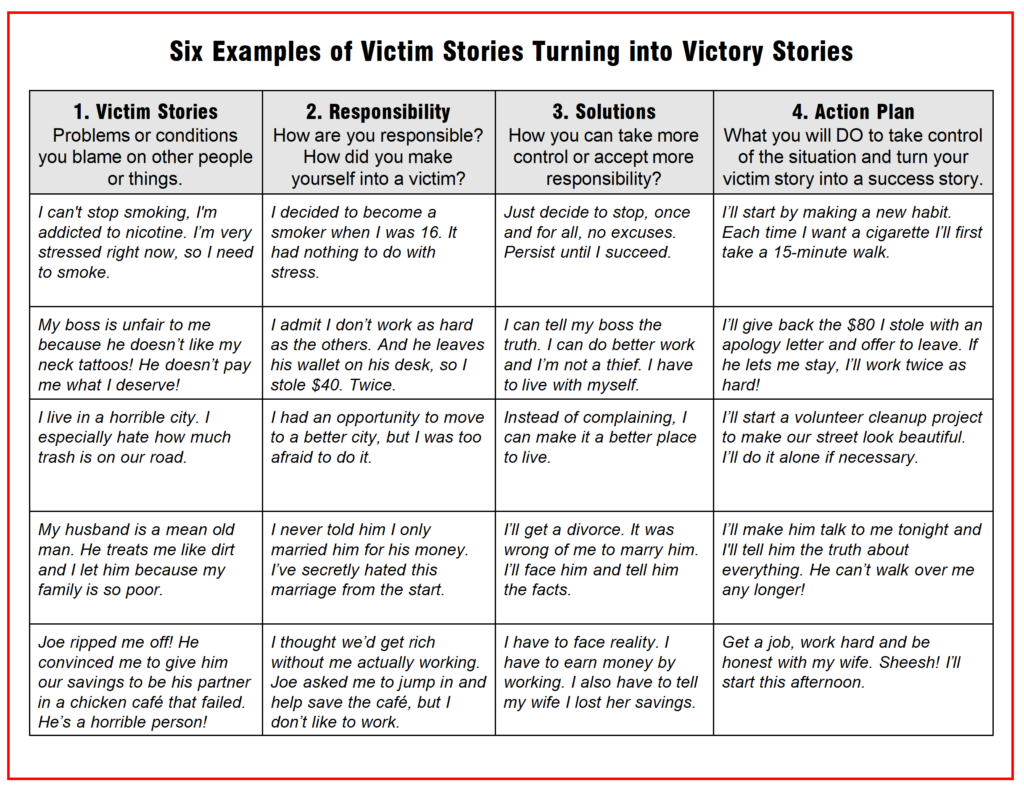The Victim Story Trap
A victim story is what you sometimes use to explain your troubles and failures. It describes why you are a victim of someone or something. It’s a trap.
For example, every time something goes wrong in Jill’s life, she blames someone. Her parents didn’t raise her right, her boss doesn’t recognize her talents and her friends don’t care about her struggles. But Jill’s real problem isn’t the world. She’s trapped by her victim story. It’s her STORY that ruins her life.
In this article, you’ll learn how victim stories hold you back and how to erase their power over you.
Four Types of Victim Stories
- Blame a person. “I constantly think about how I was ___ (ignored, ridiculed, criticized, attacked, betrayed, etc.) by ___ (person).”
- Blame an experience. “My life was ruined by ___ (a disease, my alcoholic father, a car accident, a bad investment, a fire, etc.).”
- Blame society. “Everyone’s against me because I’m ___ (brown, female, old, Canadian, gay, etc.).”
- Blame your circumstances. “I can’t be happy because of ___ (the weather, my lumpy bed, the daily news, this city, etc.).”
Six Ways Victim Stories Can Ruin Your Life
- You might use your victim story to constantly complain about someone or to ruin his or her life; to make yourself right and the other person wrong. Seeking revenge is a sad, evil purpose.
- Because of your victim story, people might give you a lot of warm sympathy. They are nice to you if they feel sorry for you. You get rewarded for the wrong things.
- It can explain why you drink, gamble, use drugs, gain weight, build up debt or watch TV all day.
- You might use your victim story to get out of doing hard work, facing tough situations or being responsible. You cannot succeed without these three skills.
- It can explain your negative emotions, like sadness, fear and anger. Any joy you feel is temporary.
- Thanks to your victim story, you have a great reason to fail. You can be broke and miserable. You don’t need to reach your goals.
Why Victim Stories Hold You Back
When you blame someone or something for your bad condition, you give power to that person or thing. You deliberately put yourself “at effect” instead of being in control or “at cause” of the situation.


“Blaming something else makes that something else cause; that cause takes on power. The individual loses control and becomes effect.” — L. Ron Hubbard
As a victim, you admit someone or something has control of you. You are just a victim and cannot succeed.
As a result, you tell yourself your victim story every day. It makes you unhappy. It hurts your relationships. It interferes with your work and your sleep.
For example, your business is failing and you blame your office manager. Your victim story is, “She stole $10,000 from me which almost ruined my business.” It’s like you are saying, “My evil office manager controls me and my business.”
If you stop believing this victim story, you can take control of your business and say, “I need to find a better office manager and train her.”
As another example, you decide your parents did a bad job of raising you. You say, “My parents ruined my life,” which is the same as saying, “Even though I’m 45, my parents are so powerful, they control my mood and my emotions.”
If you abandon this victim story and accept responsibility for yourself, you have new hope. “My parents didn’t ruin my life. I ruined my life by smoking pot in high school, and by being lazy and unemployed. I need to step up and get busy.”
In other words, you take control. You stop being “effect” and start being “cause.”
Four Steps to Turn Victim Stories into Victory Stories
1. Write Down Your Victim Stories
List the problems or conditions you blame on other people, on your past or your circumstances.
2. Take Responsibility
Write how you are responsible for each problem or condition. What did you do to create the problem? How did you make yourself into a victim?
3. Identify Solutions
Write how you can take more control or accept more responsibility for each.
4. Take Action
Write down the action steps you will take for each problem or condition.
If you then DO the action steps, you stop being a victim. You forget your victim story. You take control!
Jill Rewrites Her Victim Story
1. Jill sits down and does the first step. She writes,
“Nothing in my life goes right because my parents didn’t raise me properly, my boss doesn’t recognize my talents and my friends don’t care about my struggles. I’ve tried really hard, but the world holds me back. It’s so unfair!”
2. Next, Jill moves on to the second step: How am I responsible?
She struggles with this step, but eventually realizes it’s time to change, “OK, I can admit I’m not very nice to people unless they treat me like a princess. It used to work really well! I’d just pout or have a tantrum until people did what I wanted, but not any longer.” It takes a few days for her to accept this truth.
3. Jill continues with the third step: How can I be more responsible? How can I take control?
Jill takes a deep breath and writes, “I have to let go and admit I’m not really a princess. I can’t expect others to do what I want just because I complain. My parents did their best, but now it’s up to me to grow. My boss doesn’t owe me recognition—I need to earn it. And my friends might not understand my struggles, but they might if I try to understand their struggles also. My happiness is in my hands.”
4. Jill moves to the fourth step and writes her plan. She decides to act immediately.
The next morning, Jill asks her boss for an evaluation to see how she can improve. Her boss is impressed and gives her an hour of useful information. It’s not easy for Jill to listen to this as she disagrees with a few things, but she just takes notes. She thanks him for his time and is surprised to see he’s smiling.
That night, she texts a close friend and admits she hasn’t been as kind to her as she should be. She invites her to lunch to talk. Her friend is surprised but grateful. They have a heart-to-heart conversation that deepens their friendship.
Jill then meets with her parents. She apologizes for being so mean to them. She thanks them for doing their best and promises to pay them back with kindness and support from now on. Her parents hug her. They’re very happy about her change.
As Jill drives to her apartment, she can’t believe how good she feels. She’s excited about a future SHE will create. She has escaped her victim story.
Five Benefits of Taking More Control and Responsibility
- You stop wasting energy on blame and revenge.
- You take action and improve your circumstances.
- You make better decisions.
- You feel proud instead of powerless.
- You become the most powerful force in your life.
Next read: “The Power of Responsibility.”
P.S. Be sure to share this article with anyone who is suffering from their victim story.
The Victim Story Trap
A victim story is what you sometimes use to explain your troubles and failures. It describes why you are a victim of someone or something. It’s a trap.
For example, every time something goes wrong in Jill’s life, she blames someone. Her parents didn’t raise her right, her boss doesn’t recognize her talents and her friends don’t care about her struggles. But Jill’s real problem isn’t the world. She’s trapped by her victim story. It’s her STORY that ruins her life.
In this article, you’ll learn how victim stories hold you back and how to erase their power over you.
Four Types of Victim Stories
- Blame a person. “I constantly think about how I was ___ (ignored, ridiculed, criticized, attacked, betrayed, etc.) by ___ (person).”
- Blame an experience. “My life was ruined by ___ (a disease, my alcoholic father, a car accident, a bad investment, a fire, etc.).”
- Blame society. “Everyone’s against me because I’m ___ (brown, female, old, Canadian, gay, etc.).”
- Blame your circumstances. “I can’t be happy because of ___ (the weather, my lumpy bed, the daily news, this city, etc.).”
Six Ways Victim Stories Can Ruin Your Life
- You might use your victim story to constantly complain about someone or to ruin his or her life; to make yourself right and the other person wrong. Seeking revenge is a sad, evil purpose.
- Because of your victim story, people might give you a lot of warm sympathy. They are nice to you if they feel sorry for you. You get rewarded for the wrong things.
- It can explain why you drink, gamble, use drugs, gain weight, build up debt or watch TV all day.
- You might use your victim story to get out of doing hard work, facing tough situations or being responsible. You cannot succeed without these three skills.
- It can explain your negative emotions, like sadness, fear and anger. Any joy you feel is temporary.
- Thanks to your victim story, you have a great reason to fail. You can be broke and miserable. You don’t need to reach your goals.
Why Victim Stories Hold You Back
When you blame someone or something for your bad condition, you give power to that person or thing. You deliberately put yourself “at effect” instead of being in control or “at cause” of the situation.

“Blaming something else makes that something else cause; that cause takes on power. The individual loses control and becomes effect.” — L. Ron Hubbard
As a victim, you admit someone or something has control of you. You are just a victim and cannot succeed.
As a result, you tell yourself your victim story every day. It makes you unhappy. It hurts your relationships. It interferes with your work and your sleep.
For example, your business is failing and you blame your office manager. Your victim story is, “She stole $10,000 from me which almost ruined my business.” It’s like you are saying, “My evil office manager controls me and my business.”
If you stop believing this victim story, you can take control of your business and say, “I need to find a better office manager and train her.”
As another example, you decide your parents did a bad job of raising you. You say, “My parents ruined my life,” which is the same as saying, “Even though I’m 45, my parents are so powerful, they control my mood and my emotions.”
If you abandon this victim story and accept responsibility for yourself, you have new hope. “My parents didn’t ruin my life. I ruined my life by smoking pot in high school, and by being lazy and unemployed. I need to step up and get busy.”
In other words, you take control. You stop being “effect” and start being “cause.”
Four Steps to Turn Victim Stories into Victory Stories
1. Write Down Your Victim Stories
List the problems or conditions you blame on other people, on your past or your circumstances.
2. Take Responsibility
Write how you are responsible for each problem or condition. What did you do to create the problem? How did you make yourself into a victim?
3. Identify Solutions
Write how you can take more control or accept more responsibility for each.
4. Take Action
Write down the action steps you will take for each problem or condition.
If you then DO the action steps, you stop being a victim. You forget your victim story. You take control!
Jill Rewrites Her Victim Story
1. Jill sits down and does the first step. She writes,
“Nothing in my life goes right because my parents didn’t raise me properly, my boss doesn’t recognize my talents and my friends don’t care about my struggles. I’ve tried really hard, but the world holds me back. It’s so unfair!”
2. Next, Jill moves on to the second step: How am I responsible?
She struggles with this step, but eventually realizes it’s time to change, “OK, I can admit I’m not very nice to people unless they treat me like a princess. It used to work really well! I’d just pout or have a tantrum until people did what I wanted, but not any longer.” It takes a few days for her to accept this truth.
3. Jill continues with the third step: How can I be more responsible? How can I take control?
Jill takes a deep breath and writes, “I have to let go and admit I’m not really a princess. I can’t expect others to do what I want just because I complain. My parents did their best, but now it’s up to me to grow. My boss doesn’t owe me recognition—I need to earn it. And my friends might not understand my struggles, but they might if I try to understand their struggles also. My happiness is in my hands.”
4. Jill moves to the fourth step and writes her plan. She decides to act immediately.
The next morning, Jill asks her boss for an evaluation to see how she can improve. Her boss is impressed and gives her an hour of useful information. It’s not easy for Jill to listen to this as she disagrees with a few things, but she just takes notes. She thanks him for his time and is surprised to see he’s smiling.
That night, she texts a close friend and admits she hasn’t been as kind to her as she should be. She invites her to lunch to talk. Her friend is surprised but grateful. They have a heart-to-heart conversation that deepens their friendship.
Jill then meets with her parents. She apologizes for being so mean to them. She thanks them for doing their best and promises to pay them back with kindness and support from now on. Her parents hug her. They’re very happy about her change.
As Jill drives to her apartment, she can’t believe how good she feels. She’s excited about a future SHE will create. She has escaped her victim story.
Five Benefits of Taking More Control and Responsibility
- You stop wasting energy on blame and revenge.
- You take action and improve your circumstances.
- You make better decisions.
- You feel proud instead of powerless.
- You become the most powerful force in your life.
Next read: “The Power of Responsibility.”
P.S. Be sure to share this article with anyone who is suffering from their victim story.
